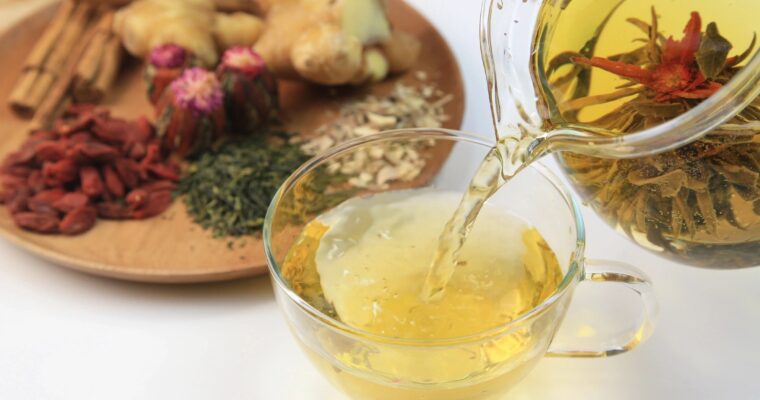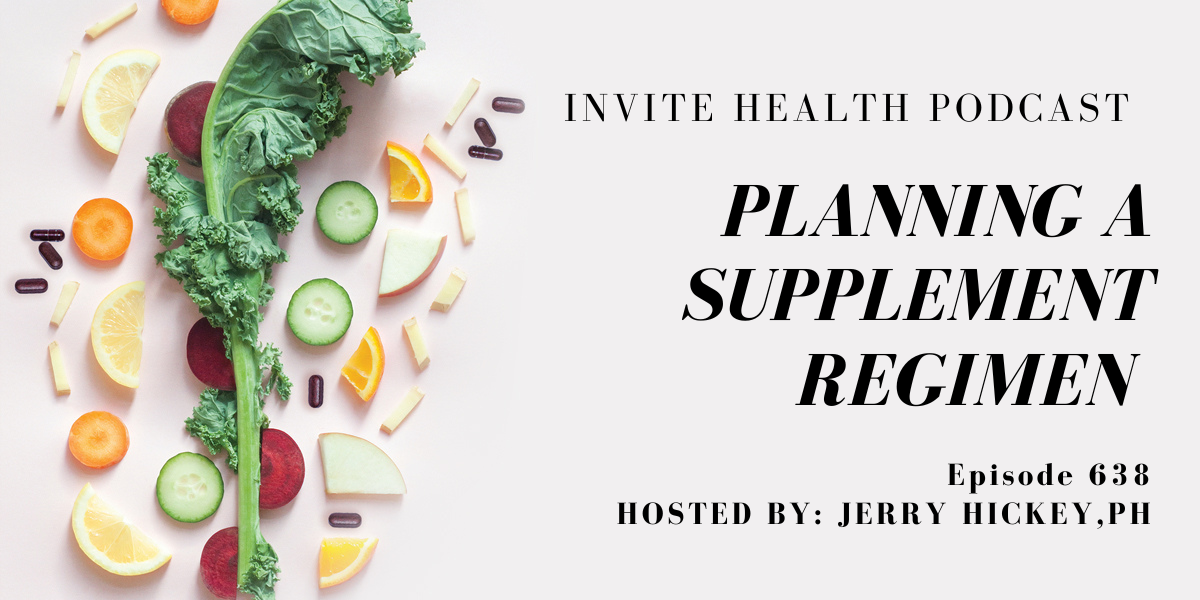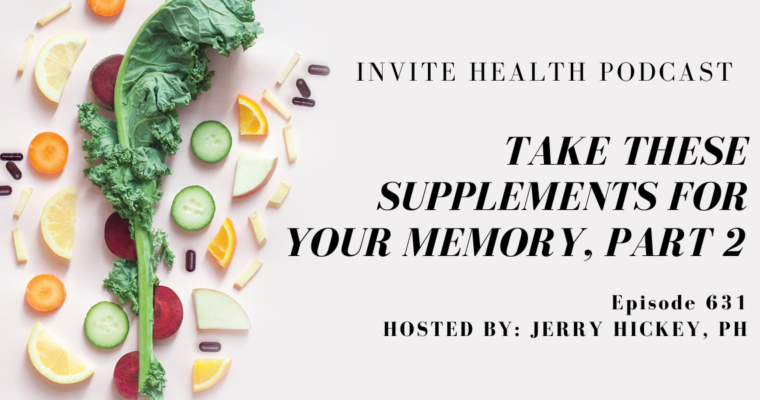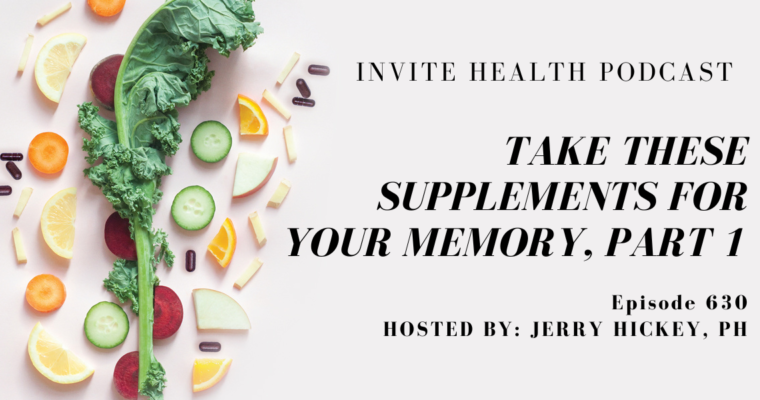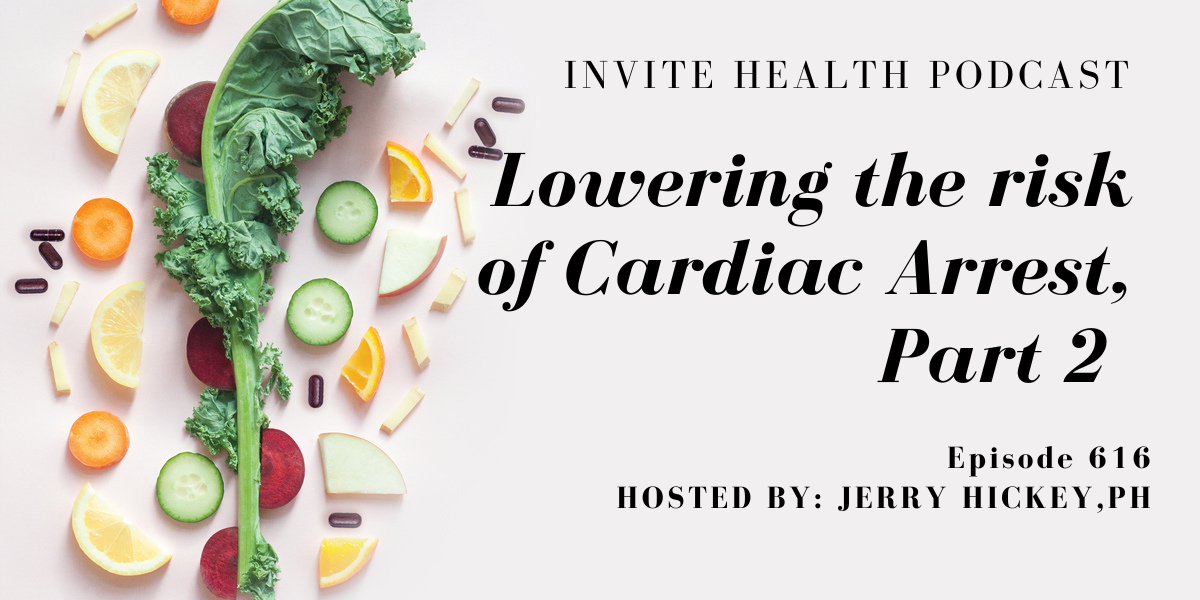Subscribe Today!
Please see below for a complete transcript of this episode.
PLANNING A SUPPLEMENT REGIMEN, INVITEⓇ HEALTH PODCAST, EPISODE 638
Hosted by Jerry Hickey, Ph.

*Intro Music*
InViteⓇ Health Podcast Intro: [00:00:04] Welcome to the InViteⓇ Health Podcast, where our degreed health care professionals are excited to offer you the most important health and wellness information you need to make informed choices about your health. You can learn more about the products discussed in each of these episodes and all that Invite Health has to offer at www.invitehealth.com/podcast. First time customers can use promo code podcast at checkout for an additional 15% off your first purchase. Let’s get started. † [00:00:34]
*Intro Music*
Jerry Hickey, Ph: [00:00:41] Over the years, many people have approached me interested in instituting a nutritional protocol. They want to set up a regimen, but they don’t quite really have it nailed down what they should include, how they should go about it. So, I’d like to cover that today, a good approach to planning a sensible supplement regimen, a general one. So, we’re not discussing specific health conditions today like insomnia. We’re not discussing diseases today such as diabetes. We have specific podcast episodes that address those situations. So, there are certain life necessities that nutrition will not replace. Nutrition can help them, but it doesn’t replace them, yet nutrition could be, we’re talking about supplements as nutrition here. Of course, food is nutrition. There are certain situations where supplements are amazingly helpful, but in general, they’re very protective and beneficial and they can help your day-to-day energy and your, you know, how effective your brain works at your occupation, etc… In any event, so welcome to our episode, my name is Jerry Hickey, I’m a nutritional pharmacist. I’m also the senior scientific officer over here at Invite Health. You can find all of the Invite podcast for free wherever you listen to a podcast or just go to invitehealth.com/podcast. You can also find Invite on Facebook, Twitter and Instagram at Invite Health, and all of the information on today’s episode will be under the description, it’ll be listed there. So, let’s get going. So these life necessities that nutrition cannot replace, of course, sleep. Sleep is a necessity. You can enhance sleep with nutrition, with a nutritional supplement like L-theanine. L-theanine is an alpha amino acid that to express out of tea leaves. And if you get enough L-theanine like 100 milligrams, 200 milligrams, it’s very soothing without being dangerous. And I’ve had instances where I’ve used it, where I’ve had deadlines the next day for the radio, etc. and I’d wake up at two or three in the morning and immediately my brain would shunt into overdrive and I knew I couldn’t get back to sleep, it would be impossible. Yet I needed to rest because I had so much to accomplish the next day. So, I’d go into my bathroom, and I’d take two l-theanine 100 milligrams, sometimes three, depending on how I felt, and within about 15 minutes I’d have a nice easy sleep and it was no problem waking up in the morning. There’s no after effect from it, you don’t feel dull in the morning. So, L-theanine can enhance sleep if you need it. And of course, if you lack sleep for a couple of nights, you can help make up for it by taking the alpha amino acid called L-Tyrosine. The amino acid L-Tyrosine, that’ll help make up for it for a couple of days. It’ll help you with paying attention and focus and mental energy, alertness, etc. But over time you cannot make up for it with nutrition. So, sleep is a necessity, a life necessity that you cannot replace with nutrition. You can help it with nutrition but not replace it. And by the way, some people can’t sleep because they just don’t get enough exercise, which brings us to our second topic. I mean, if you exercise, you’re going to sleep at night. It’s almost pretty much that simple, for most people, not all. † [00:04:10]
[00:04:10] Exercise is a must; nutrition does not replace exercise. There’s no supplement that replaces exercise. There are supplements that can enhance exercise. For instance, if you take a form of Coenzyme Q10 such as Ubiquinol, it can help with your endurance and your stamina and your energy. If you take creatine monohydrate, that can help with your power, and there are things that enhance the benefits, they improve the benefits of the exercise. So, believe it or not, green tea is one of those things, or beta hydroxy beta methylbutyrate, beta hydroxy beta methylbutyrate will help you gain muscle and other things that will improve your performance once again Ubiquinol, but also beet juice. They can improve your performance, your physical performance, but they don’t replace exercise. You have to exercise the best thing to assuage the effects to fight the effects of aging, is exercise, that’s the number one thing. † [00:05:17]
[00:05:18] Now, the next life necessity that you cannot replace with nutrition is a great diet. You can help a poor diet, but you’re not creating a great diet. You have to have a good diet. So, there was recent research. Several studies I’ve always questioned. Do you have to have simply a great diet? I mean, can you cheat? Elon Musk recently famously said, I have a donut every morning and I’m still alive. Well, yes, but we don’t know how he eats the rest of the day. If you have 80 to 90% of your total caloric intake and food intake from high quality foods, you’re probably okay. So, if you’re going to have a piece of blueberry pie, but otherwise you’re eating great food, you should be fine, you really should be. I’m a little more careful than that, and listen, of course, a good food should entail fresh vegetables, fresh fruits, good fresh nuts, seeds, legumes like lentils and peas and beans, whole grains. And I would add a lot of herbs and spices to culinary herbs and culinary spices, you know, like rosemary. I would add green tea. I would add a great culinary spice, like turmeric, I would make sure that’s in my food frequently. Lots of dark berries and apples. I mean, these are good fruits, these are good fruits, but you can enhance your diet with supplements. And this is where we’re going to go with today’s conversation. It’s very hard to ensure you’re getting every nutrient and adequate amount from your food. And if you lack any nutrient, well, that’s an issue. That’s a real issue because the things in a vitamin and mineral complex, their rate limiting factors, rate limiting factors means if you lacked them, things slow down a great deal or they don’t even go forward at all. And that’s true when vitamins and minerals, they’re vital. So, lacking any particular vitamin or any particular mineral over time can have a terrible impact on your health, a terrible impact. I’ll give you some for instances, you eat food for energy. A great deal of the reason you’re eating food is for energy. Your food is converted through a series of chemical reactions into energy for your body so your body can create more of itself and so your body can kind of function as that wonderful engine that we all so you can power up the engine of your body. This is fats, proteins and carbohydrates are converted into energy, in something called the Krebs Cycle, which is also known as the citric acid cycle. If you take biochemistry, you’ll spend many months studying the Krebs, citric acid cycle. You require B vitamins to create this energy, if you lack certain B vitamins, you are not creating energy out of your food. And if you lack other B vitamins, you can’t use the energy efficiently anyway, and you require the mineral calcium to help regulate this process. Calcium is used in a number of ways to regulate the citric acid cycle when you’re making energy out of your food. I mean, I don’t think most people realize that, you know, you know, calcium for your muscles and bones and your teeth. But calcium is also essential for energy. † [00:09:03]
TAKE THESE SUPPLEMENTS FOR YOUR MEMORY, PART 2, INVITE HEALTH PODCAST, EPISODE 631>>LISTEN NOW!
[00:09:05] Magnesium is another one. All the energy you’re creating and in that citric acid cycle would burn itself out immediately if you didn’t have magnesium, the mineral magnesium to help regulate it. And here’s another example of why you need vitamins and minerals. The minerals, selenium, iodine and zinc and also the mineral iron is required by your thyroid gland and the ability to create thyroid hormones and release them, but also to convert them into their active form. And your thyroid gland controls your metabolism. It has an effect on your, on everything, on every cell in your body, your cholesterol, your energy, your brain function, your heart rate, your digestion, your muscle function. So, lacking any single vitamin or mineral is, on a day-to-day basis detrimental to maximal function. But over time, it’s dangerous to your health, it’s very dangerous to your health. For instance, if you lack vitamin B3, not only can you not create energy out of your food, you’re going to age at accelerated rate, you’re not going to detoxify chemicals and you really can’t prevent cancer without vitamin B3. So, insurance against lacking these nutrients is taking a very high-quality multivitamin. Now, let me give you a caveat with that, if you’re older, make sure to form a folate in there as methyltetrahydrafolate, I think it’s very essential. Folate is named after foliage. You know it in many, you see it in fortified foods like breads or cereals as folic acid. The problem is not everybody can convert folic acid into its active form, methyltetrahydrafolate is the active form. You need methyltetrahydrafolate to lower the risk of cancer. It helps prevent the first two steps of the process of the cancer formation, which are called initiation and promotion to simplify it, you need to help prevent heart disease, you need it to create energy out of your food, you need as an antioxidant, but you also need it as you grow older to protect yourself from Alzheimer’s. There is a chemical process that takes place when you eat protein and a byproduct of that is called homocysteine and low levels of homocysteine are fine. We don’t know of homocysteine does anything in a positive way, just because they haven’t found out a positive function for it doesn’t mean it doesn’t have a positive function. But so far it just seems to be negative, if it’s too high, it becomes a solvent. And in certain studies, it’s been shown to chip away at your bone and joint health, at your heart health at your eyeball health. But many studies are showing it’s dangerous in the brain, if homocysteine is elevated in the brain. It really is an inflammatory component in the brain, and it’s been shown to be part and parcel of developing Alzheimer’s disease. So, you need the active version of folic acid, methyltetrahydrafolate to lower homocysteine levels. So, if you’re older, you want to make sure that your multivitamin has that form of folate called Methyltetrahydrafolate. Sometimes it’s abbreviated, MHTHF, so that’s the first thing. I think pretty much everybody in America get some benefit from taking a multivitamin. There’s a number of studies in older men and older women where their brain functions better. There are studies in children where they tend to do better academically if they’re on a multivitamin. There are studies in middle aged and younger adults that they do better with brain function when they have adequate levels of all these B vitamins, like there was a study out of England, I don’t have it in front of me. I read it years ago, but I tend to remember studies, and these were like healthy people who led a good lifestyle and well-educated people. And they found that when they gave them the B vitamins versus a placebo, they performed better, their brain performed better. They would do better at work, they were more alert, their brain had a little more energy. So even these super healthy people that are eating a diet and exercising and are well-informed, well-educated, etc., if you gave them B vitamins, there was a slight improvement in their mind function, their brain function. So that tells you something. So that becomes of course, more of an issue in people who don’t have a good diet, who don’t exercise, who don’t lead a good life, who are not well-educated. And because education matters and you can always educate yourself, you know, you just go on YouTube and you can watch videos on science and and on geography and history, etc., read a book, whatever. The thing is that it matters, and I think it becomes more of an issue when people who don’t eat well and people who are aging and people with disease states. † [00:13:54]
[00:13:56] Now, so I think everybody should have a multivitamin. If you’re lacking any particular vitamin or mineral, it’s not a good thing. So, it’s just insurance that you’re filling in the holes in your food, you know, because although certain foods have been measured, have measures that they should have a certain amount of nutrients in them, it’s not always the case that’s going to vary from vegetable. Now extra vitamin D, vitamin D is a hormone, but don’t let that word scare you. It’s not a hormone like estrogen or testosterone or a corticosteroid hormone. A hormone simply is something that’s released from one part of the body, and it works somewhere else. That’s the definition of a hormone. So, hormones typically are released from glands like the thyroid gland releases thyroid hormones. So, the hormones are typically released from glands, and they go all around the body, and they knock on the door of, in small amounts by the way, they’re released in tiny amounts because they’re so effective and they go around the whole body and they’re broadcasters, they broadcast around the whole body. They knock on every cell like knock on its front door. And if the cell requires them, it lets them in. So, there’s vitamin D receptors all over the body. We know that vitamin D has a strong impact on the immune system. It’s involved with brain function, it’s just active all over the body. So especially in the winter, it’s hard to get enough vitamin D and they’ve seen even in some sunny locations. Like Hawaii and Arizona, people with darker skin, don’t have enough vitamin D because the best sunscreen is having darker skin. So, vitamin D becomes really important as a supplement and it’s safe. I mean, I think most people, 2000 to 3000 units a day, it really varies from person to person, how much they need. Some people, especially in the summer, don’t need any. They don’t need any supplementation. Other people still need a great deal of supplementation. It seems that if you use sunscreen, yeah, of course, if you use sunscreen, if you wear a lot of clothing, if you avoid the sun, and if you have older skin or darker skin, all of these things reduce your ability to create vitamin D out of sun. So, 2000 to 3000 units a day. You take it with food, vitamin D3, which is called cholecalciferol all seems to work better than vitamin D2, which is ergocalciferol. By the way, you need magnesium, the mineral to activate your vitamin D, so when vitamin D is released from the kidneys, when vitamin D is activated by the kidneys, I should say it requires magnesium for that function. Magnesium is a really important mineral. † [00:16:42]
[00:16:44] Now, certain people need to take a probiotic. You have trillions of bacteria in your intestines, all over your skin, apparently in the urinary tract, apparently everywhere. Vaginal tissue and breast and breast milk lobes. So, in the ducts, I should say, in the ducts of the breast, there’s bacteria. See what the good bacteria, cause the bad bacteria are bad because they can inflame you and some of them take advantage of certain situations and can actually infect you. So, you need enough good bacteria. So normally you can get enough good bacteria by eating a wholesome diet, a well-rounded, healthy diet, but there are some issues that affect that ability. For instance, if you’re obese, obese people have been found to have a predominance or there’s so many inflammatory causing bacteria, pro-inflammatory bacteria, that they need more healthy bacteria, they need more of the good bacteria. So, people who are obese, people who have diabetes and prediabetes tend to have a poor mix of bacteria, they tend to have more of the pro-inflammatory bacteria, people who smoke, people who drink alcohol. Apparently, people who use a lot of aerosols, it kills, it gets into you, and it kills your good bacteria, people on a poor diet because the bacteria require fiber to live. So, if you’re not eating a good diet, you’re not getting the fiber, the bacteria, the good bacteria don’t survive. And if you’re in a city with a lot of pollution, the pollution seems to kill off your good bacteria. And, of course, certain drugs, a lot of drugs, apparently, but especially antibiotics kill off your good bacteria. So, these people really should have a probiotic. The healthy bacteria in your gut are really essential for your immune system, they’re essential for good brain function. They’re essential for helping to prevent diabetes and obesity because they help control your appetite. They’re essential for helping to prevent colon cancer. They’re essential for regularity, so you don’t have diarrhea and constipation, etc… They even seem to help defend you from developing allergies and perhaps can even help you get rid of your existing allergies or mitigate them at least. So, a lot of people oh, by the way, the aging process, I’ve seen studies that included millions of people whereas you grow older, you tend to lose off your good bacteria. It’s some kind of biochemical thing, they don’t exactly know why. So, if you’re older, you need a probiotic. Now, generally a mixture of Lactobacilli and Bifidobacterium is a good way to go, that’s the way I go. Initially, I took the probiotic daily for about six months and then I started taking it every two or three days just to really have these bacteria grow in number in my intestines, that’s called colonizing, it’s called colonizing. So, I gave them six months to really get a head start and really, really, really, really get set, and then every two or three days, I take a probiotic just as a booster just to make sure I’m okay. There’s also prebiotics, which are food for the bacteria. † [00:20:07]
[00:20:07] I used to have a friend named Dr. Allan Pressman, who I miss immensely. Many of you know of him, he was very popular, very well known, big author, big time on radio, big in education. And any event he often he used to say, hey, you wouldn’t buy goldfish or goldfish food. Why would you buy probiotic bacteria without probiotic bacteria food? So, a prebiotic, usually it’s from chicory root. That’s a relative of Belgian Endive, it has a fiber called fructose oligosaccharides that is a good source of food, this fiber is good source of food for these bacteria. And it’s not offensive, in fact, it’s rather healthy, FOS. So, so far, I said a probiotic for many people, extra vitamin D for most people, and a good multivitamin & mineral. And if you’re older, make sure you get an methyltetrahydrafolate as the form of folic acid in that multi. Now, is there anything else required in the day-to-day basis? Well, you know, diseases change this, so make sure you speak to our nutritionists. If you’re if you have some kind of disease state like diabetes, because if you’re diabetic, you want to get extra Zinc and extra magnesium along with the vitamin D to help control your blood sugar. All three are required. So, if you have some kind of condition that really needs attention, speak to one of our nutritionists to get some advice on your protocol. But let’s get back to the things we really need, fish. Fish Oil is really important. There’s something called the omega three index, the omega three index, pardon me. The omega three index quantifies the amount of fish oils on the, it’s on the membrane of our cell, the outside of our cell, the housing of our cell. So, on a cellular membrane is all these fats, you know, maybe there’s some butter, maybe there’s some margarine, olive oil. So, they look at the types of fats, the saturated fat, the monounsaturated fat, the polyunsaturated fat, and then they look at the fish oils and they compared them. And there has to be a certain percentage of fish oils for you to really stay healthy. I mean, your brain is made out of fats and has a large component of fish oils and that, so you need a good amount of fish oils for the brain to function. And that’s, that’s clearly a requirement for the human body. The brain requires fish oils, the omega three fatty acids, generally EPA and DHA. But there’s also DPA. And these get into the membrane of your brain cell, and they help it to function properly, and they help prevent depression, and they literally help prevent different forms of mental senility like Alzheimer’s disease. So, fish oils are very important. And there’s enough data to show that fish oils lower the risk of sudden cardiac death, Sudden cardiac death. About 350,000 Americans each year suffer from cardiac arrest, in general, 350,000 Americans a year suffer from cardiac arrest, sometimes it’s 300,000, sometimes 400,000, in general, 350,000. Now, if the heart doesn’t start beating again, then it’s called sudden cardiac death. And it happens very rapidly, I mean, there’s really not much chance that you’re going to make it into an ambulance or get to a hospital. So about 10%, maybe 8% of these people survive out of 350,000. So that’s like 35,000 out of 350,000. So, there’s plenty of evidence from many, many studies for many, many meta-analyses. A meta-analysis is what a group study is like, like type studies. It gives you more people, it gives you more academic research institutions. And when you have this greater population, it’s a more accurate measure of something works or not. And many meta-analyses showed that fish oils really have a strong ability to lower the risk of sudden cardiac death. So, because fish oils are so essential for the brain and because fish oils are so essential for lowering the risk of sudden cardiac death, I would recommend that everybody’s on fish oils. It becomes more important if you’re on a statin because statins lowered a level fish oils in your body, according to Japanese research. And it becomes more important as you grow older because for some reason, I’m older. As you grow older, it seems to be harder to utilize the fish oils, so you need a little bit extra. So, an older person on a statin drug like Rosuvastatin, they really need fish oils, it’s really important. † [00:24:42]
ICYMI:DANGERS OF OVER-THE-COUNTER DRUGS & THE NUTRIENTS THAT MAY GET DEPLETED. INVITE HEALTH PODCAST, EPISODE 633>>LISTEN NOW!
[00:24:44] Fish oils also have an impact on the eyes, on your bones, on your skin, on your muscles, not just the heart and the brain, but also on women’s breasts. So, they’re really important, on the colon they have an impact, on the immune system they have an impact. So, fish oils are important. So far, a probiotic, & fish oils, a multivitamin and additional Vitamin D for most people. And that right there covers a lot of the needs when it comes to taking a nutritional supplement. Now, for older people, they must have some form of coenzyme Q10, so I would add that, I think that’s essential for older people. Our ability to convert Coenzyme Q10 into its active form, the active form is called Ubiquinol, really declines with age, really declines in your fifties and sixties and seventies. So not only do I think older people need CoQ10. They need a specific form of CoQ10 called Ubiquinol. Now, Ubiquinol and younger adults has been shown to improve physical performance in sports, but us older people, it’s been shown to help really keep our heart functioning at a proper rate and help prevent fatigue and assuage fatigue. So that’s really important. Ubiquinol, the Ubiquinol to get is by Kaneka, they make it down in Texas. That’s the one, that’s the only one that’s made in the United States, that’s the one to go with. Now, additionally for older people, you want Lutein. Lutein is a pigment in vegetables and fruits. There’s a little bit in the yolk of eggs and lutein is essential for memory and vision and it gets harder to absorb lutein from food with age. So, Lutein is a must for older people as part of their day-to-day regimen. A little bit of extra Zinc. Zinc becomes harder to absorb with age, and Zinc is responsible for protecting the brain, protecting the eyes and helps the thyroid function. And, you know, your thyroid controls metabolism. It helps to control your blood sugar. You need it for digesting your food, you need it for healing, you need to keep the arteries in your heart clean. You need it for your immune system. There’s many and to protect you from your immune system. So, Zinc, a little extra zinc is important for older people and collagen. We make collagen when we’re growing, we make it in abundance. You eat any protein, it could be an egg, it could be soybeans, it could be anything grains, and you convert the protein in these things into collagen. So, because collagen makes you, it’s the second most common ingredient in human body after water. Your skin is about 70% collagen. The cartilage in your knee joint is about 67% collagen, your bone is about 36% collagen, so collagen’s really, really important, it makes up your spinal tissue. It makes the menisci in your joint under your knees that supports these tissues. So, collagen, is really important, older people do not make enough. They should get a real high quality collagen supplement. There’s a company, an Italian French company that makes one called Peptan. Like I use Peptan B 5000 every day or most days, because you need to remake yourself, you need to keep yourself functioning. In fact, even collagen content in your brain and in your blood vessel walls and, in the valves, in your heart, valves in your kidneys, etc. So, it helps prevent wear and tear in the body. The ones you rise is water and collagen and it’s 1% collagen. So, collagen is really essential to the human body, so that’s another thing. Older people can also think of adding a powerful brain antioxidant like either resveratrol, you have to get a resveratrol that’s protected from light and oxygen, otherwise, it’s not working. It’s been deactivated or a well absorbed turmeric like bio-curcumin or the curcumin that comes with the black pepper constituent, because these are really good. I’m not giving you all the supplements that are good, I’m giving you what I think is a really smart protocol. So, if you have any questions on that, you can contact our nutritionist, just go to invitehealth.com, they’ll give you all the info, what stores or what phone numbers or whatever, live chat, etc. if you have any questions on anything I said. So, all of the information on today’s program is listed where we discuss the program episode and you can listen to this episode, any of our episodes for free wherever you listen to podcasts or just go to invitehealth.com/podcast. You can also find Invite on Facebook, Instagram and Twitter at Invite Health. And I want to thank you for listening in. This is Jerry Hickey, signing off, hope to see you next time on the next episode of Invite Health. † [00:24:44]
*Exit Music*


